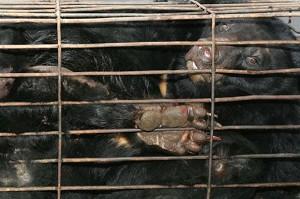On December 20, the Hong Kong’s Wenwei News exposed the maltreatment of more than 7,000 black bears in Mainland China. Traditional Chinese medicine considers the bile salts of bear gallbladders to be a very powerful medicine.
Internationally, black bears are classified as a protected animal. According to the report, there are at least 200 private bear farms in China. It is estimated that more than 7,000 black bears are kept in these farms, and each one of them is maltreated and kept in appalling conditions.
Assisted by the Animals Asia Foundation, the Wenwei reporter visited many private bear farms over a 3 month period, gaining an inside view and uncovering the tip of the iceberg of this bloody business. The animals are caged in dark sheds, and locked in rusted iron cages. Each bear has a metal box attached to it, connecting a rubber tube from it’s gallbladder to a bag. The bears’ bile goes along this tube drip by drip. And the tube is not changed until the bear dies.
Deplorable Conditions
These black bears stay so still, at first sight they look dead already. They live in the dark, surrounded by an overpowering stench. They are extremely thin, with patches of skin showing where their fur has fallen away. Every bear rolls up in a ball, with their paws full of cracks because they do not have a chance to touch the ground. Since they are continuously locked in cages for years, they only live one-third of their normal life span.
According to the report, at one time there were more than 400 private bear farms, caging more than 10,000 bears. Most of them are scattered in Heilongjiang, Jilin, Sichuan, and Yunnan Provinces. But an official in Jilin Province has disclosed that there are about 70 bear farms just in the Yanbian area, of which only 11 hold permits. There are up to 2,100 black bears in this area alone.
Medicinal Use Only Accounts for One-Sixth of Bile Produced
In an article by Yvonne Lau, CEO Mayway Corp. assisted by Jill Robinson of the Animals Asia Foundation, it is reported that according to an official at the China Science Institute, who would only speak on condition of anonymity, at this time (2003) China produces approximately 6000 kilograms of bear bile per year, but its demand by the traditional Chinese medicine industry is only about 500 kilograms per year.
As bear farming is such an important part of local economies in certain regions, China is blindly supporting research on other medicinal uses of bear bile. This has resulted in the development and marketing of bear bile wine, beverages, and even shampoo.
Expanding markets will only cause the suffering of more bears.





